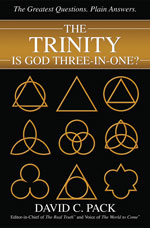In this scripture, the apostle Peter stated, “Ananias, why has Satan filled your heart to lie to the Holy Spirit, and to keep back part of the price of the land? Whiles it remained, was it not your own? And after it was sold, was it not in your own power? Why have you conceived this thing in your heart? You have not lied unto men, but unto God.”
How could Peter say that Ananias and Sapphira were lying to the Holy Spirit? Because it was the Holy Spirit in Peter’s mind that gave him the ability to discern (Heb. 5:14) Ananias and Sapphira’s lies. Notice I Corinthians 2:11: “For what man knows the things of a man, save the spirit of man which is in him? Even so the things of God knows no man, but the Spirit of God.” This verse shows that there are things that we can learn and understand without having God’s Holy Spirit, and things that can only be understood with God’s Spirit.
Christ evidenced this ability of discernment in John 13:27: “And after the sop Satan entered into him [Judas]. Then said Jesus unto him, That you do, do quickly.” Also notice Mark 8:33: “But when He [Christ] had turned about and looked on His disciples, He rebuked Peter, saying, Get you behind Me, Satan: for you savor not the things that be of God, but the things that be of men.” (For the explanation of this verse, see the Q&A concerning Mark 8:33.)
In Old Testament times, God spoke directly to His chosen servants. Notice the following account: “And the Lord said unto Ahijah, Behold, the wife of Jeroboam comes to ask a thing of you for her son; for he is sick: thus and thus shall you say unto her; for it shall be, when she comes in, that she shall feign herself to be another woman” (I Kgs. 14:5). God had revealed to His prophet that Jeroboam’s wife was on her way and that she was going to lie. He told the prophet how to respond.
Also notice: “…for the Lord searches all hearts, and understands all the imaginations of the thoughts…” (I Chron. 28:9). Also: “For God has not given us the spirit of fear, but of power, and of love, and of a sound mind” (II Tim. 1:7). To understand how Peter could “see through” Ananias and Sapphira, consider the following analogy:
An attorney is discussing an extremely technical legal matter with a potential client. The implications are such that only a lawyer with the utmost legal understanding could properly handle the case. Also, only with complete and total knowledge of every aspect and detail of the situation can the lawyer hope to proceed. But the client, having dishonest ulterior motives, intentionally omits some minor details. Those details are so minute that they could potentially escape the attention of an attorney not deeply, intricately versed in the law. (If he were fresh from law school, he would definitely miss them.) But the attorney sees the deception for what it is. How does he see through it? Because of the knowledge of the law that he possesses. Without that knowledge, he would not recognize the lie for what it is. His knowledge of the law leads him to understand the man’s ulterior motives.
If one lies to a farmer about a matter dealing with aerospace engineering, he might not recognize the lie. Likewise, if one lies to a rocket scientist about a matter concerning agriculture, he might not recognize the lie. Why? Because neither is versed in the particular subject being addressed. The lie goes “right over his head.”
It is the same with spiritual understanding. Notice I Corinthians 8:7: “Howbeit there is not in every man that knowledge…” Job 39:17: “Because God has deprived her of wisdom, neither has He imparted to her understanding.” Romans 8:14: “For as many as are led by the Spirit of God, they are the sons of God.” John 16:13, referred to earlier, shows, “…the Spirit of truth…will guide you into all truth.” In Acts 5, Peter, guided by God’s Spirit working in his mind, was able to discern the following about Ananias and Sapphira:
- They had conspired together and were on their way to see him
- Their sin and their motive
- The punishment they would receive
After being given on Pentecost in A.D. 31, the Holy Spirit was the means by which God communicated to His servants (John 16:13).
When Ananias and Sapphira lied to Peter, he could say that they were also lying to God because:
- Peter was the leading apostle in God’s Church. Christ had told him, “…Whatsoever you shall bind on earth shall be bound in heaven: and whatsoever you shall loose on earth shall be loosed in heaven” (Matt. 18:18).
- Christ had also told His disciples, “And whatsoever you shall ask in My name, that will I do, that the Father may be glorified in the Son. If you shall ask any thing in My name, I will do it” (John 14:13-14). Christ had given His disciples power to act on His behalf. God had to guide them in these matters.
- Conversely, He showed, in Matthew 25:40, that anything done to or for true Christians, was considered to be done to or for Him: “…Inasmuch as you have done it unto one of the least of these My brethren, you have done it unto Me.”
Also notice the following Old Testament accounts:
- “And the people murmured against Moses, saying, What shall we drink?” (Ex. 15:24)
- “And the whole congregation of the children of Israel murmured against Moses and Aaron in the wilderness…And in the morning, then you shall see the glory of the Lord; for that He hears your murmurings against the Lord: and what are we, that you murmur against us?…for that the Lord hears your murmurings which you murmur against Him: and what are we? Your murmurings are not against us, but against the Lord” (Ex. 16:2, 7-8).
- “And the Lord said unto Samuel, Hearken unto the voice of the people in all that they say unto you: for they have not rejected you, but they have rejected Me, that I should not reign over them” (I Sam. 8:7).
The above illustrates why Peter could say that Ananias and Sapphira were lying to both God and the Holy Spirit. It was not because the Holy Spirit is God, as trinitarians claim. They were lying to one of God’s apostles, in whom He was working (through the power of His Holy Spirit).
Also, consider Peter’s statement, “…You have not lied unto men…” Advocates of the trinity doctrine seem to completely ignore the fact that the husband and wife had lied directly to Peter (a man). Peter was a flesh-and-blood human being. Was he somehow elevating himself to the status of either God or the Holy Spirit? (See Acts 14:7-18.)
Why do trinitarians not consider that part of Peter’s statement? Their argument has no strength, because it is inconsistent and does not examine every aspect of the account. As is always the case, religionists have taken a single scripture out of context and either ignored or maligned other scriptures, building a doctrinal “house of cards.”
To learn more, read our book The Trinity – Is God Three-In-One?



















